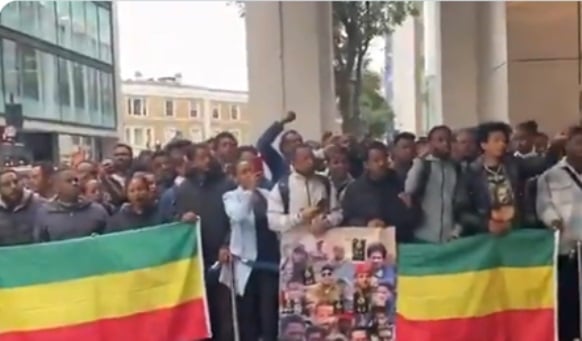London — Zehabesha News Desk
 A major diplomatic embarrassment unfolded in London this week as Prime Minister Abiy Ahmed’s so-called National Dialogue Commission was met with firm rejection and protest from members of the Ethiopian diaspora. The event, which had been promoted by the Ethiopian Embassy as a step toward “national reconciliation,” quickly turned into a display of public discontent, with protesters accusing the government of hypocrisy, repression, and moral bankruptcy.
A major diplomatic embarrassment unfolded in London this week as Prime Minister Abiy Ahmed’s so-called National Dialogue Commission was met with firm rejection and protest from members of the Ethiopian diaspora. The event, which had been promoted by the Ethiopian Embassy as a step toward “national reconciliation,” quickly turned into a display of public discontent, with protesters accusing the government of hypocrisy, repression, and moral bankruptcy.
Diaspora activists, civic groups, and human-rights advocates gathered outside the Park Plaza Victoria Hotel, where the commission was scheduled to hold consultations, chanting “No dialogue with criminals!” and “Justice before reconciliation!” Demonstrators held signs bearing images of victims of state violence and banners reading, “Ethiopia needs truth, not propaganda.”
Observers say the scene in London underscores the deep mistrust between Abiy Ahmed’s government and the Ethiopian public—both at home and abroad. Critics argue that a regime accused of mass atrocities, political imprisonment, and extrajudicial killings cannot credibly lead a “dialogue” process while suppressing dissent and silencing opposition media.
According to political analysts who spoke to Zehabesha, the commission—originally established under Abiy’s administration as part of a “transitional justice” initiative—has lost legitimacy. “You cannot have meaningful dialogue while Fano fighters, journalists, and opposition members are in prison,” one observer said. “What the people want is accountability, not empty conferences.”
The London protest reflects a growing international awareness of the crisis of governance in Ethiopia. The country’s so-called “transition to peace” has been marred by renewed conflict in Amhara and Oromia regions, arbitrary detentions, and severe humanitarian abuses. Many participants at the London demonstration emphasized that any future transitional government must exclude those implicated in war crimes and human-rights violations.
“Abiy Ahmed’s regime cannot lecture the world about dialogue while it wages war against its own citizens,” said one protest organizer. “There can be no reconciliation without justice.”
As Ethiopia edges closer to political breakdown, calls for an independent transitional authority are gaining momentum. For many Ethiopians, the events in London symbolized the collapse of Abiy’s international credibility and the rise of a new demand for genuine democratic change.
